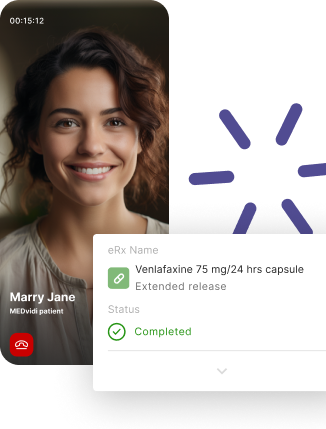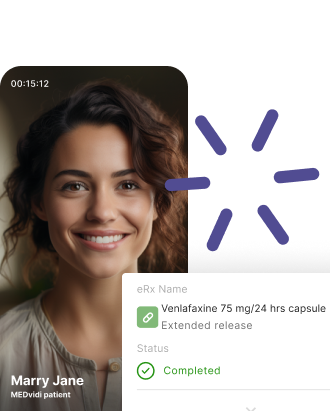Highlights
- Heart palpitations mean the feeling of the heart beating in an unusual way. This might be of the heart racing, pounding, or skipping beats.
- Anxiety and other mental health disorders cause about 3 out of 10 cases of heart palpitations.
- It might be difficult to tell anxiety palpitations from heart palpitations caused by heart disease or other medical causes.
Believe it or not, nearly
Noticing that your heart is beating strangely is distressing, and you wonder what triggered this sensation. Could it be that you are very stressed and anxious at the moment, or is it a problem with your heart? These are valid concerns that we will address in this article.
Anxiety is manageable


Can Anxiety Cause Heart Palpitations?
Yes, definitely; you can get heart palpitations from anxiety, they commonly occur together. Usually, it is anxiety that causes heart palpitations, but the opposite could also be true. Experiencing an unusual heartbeat can be upsetting and cause people to feel anxious.
When anxiety causes heart palpitations, it can happen within just a few minutes.

Why Does Anxiety Cause Heart Palpitations?
It’s because anxiety activates the body’s autonomic nervous system. That sounds complicated, but it’s effectively an
Palpitations, which might present as a racing or pounding heart, are just one of the symptoms of this stress response.
Below is a list of other physical symptoms and signs that might occur if heart palpitations are caused by anxiety:
- High blood pressure
- Chest tightness or chest pain
- Shortness of breath
- Dizziness
- Nausea and stomach pain
- Flushing and sweating
- Tremors and shakes
- Jittery feelings
- Tingling and numbness around your lips and your fingers

What Are Heart Palpitations Due to Anxiety?
It all comes down to fear. During the anxiety-induced fight-or-flight response, your body and brain want you to escape, which means your muscles need to move! To get active quickly, they need oxygen as fuel. So, the clever automatic response gets you breathing faster to increase oxygen levels and your heart pumping faster to move the oxygen to where it is needed. Anytime your heart rate increases suddenly, you may experience heart rhythm disturbances.
These rhythm changes—you don’t need to remember this—are called
Heart palpitations from anxiety, or other causes, might feel like:
- A fast, fluttering, or racing heartbeat
- An irregular heartbeat
- Skipped, flip-flop heartbeats
- A knocking or pounding heartbeat that makes your chest wall lift
In fact, anxiety-induced heart palpitations can be a combination of the above physical sensations.
A study estimated that up to
Other Causes of Heart Palpitations
Other than being a symptom of anxiety, palpitations can be a normal response in certain situations or also be a warning of underlying physical health conditions. Below is a list of the common causes, there are others.
High output states:
- Response to fever
- Pregnancy
- Normal high heart rate (sinus tachycardia)
- Anemia
Metabolic conditions:
- Thyroid disease
- Low blood sugar
- Changes in blood calcium, potassium, and magnesium.
Foods and medication:
- High caffeine beverages
- Cold medicines
- Marijuana
- Recreational drugs such as cocaine and MDMA
- ADHD stimulants
High adrenalin:
- Exercise
- Stress or trauma
Mental health conditions:
Heart disease:
- Heart failure
- Heart attacks
- Aneurysms
- Enlarged heart
Mental health conditions account for 31% of cases, but heart disease trumps that and is the underlying source of 43% of palpitations. Consult a medical provider if heart palpitations bother you to get timely help.
Anxiety Palpitations vs A-fib Palpitations
Classically, it causes an irregular heartbeat. This means that not only is the time between every beat different, but the strength of every beat also varies; A-fib heart rate can be fast or normal. A-fib is serious because it is a risk factor for stroke and might be a warning of underlying heart disease.
Often, people who have atrial fibrillation feel fine, and the only way to diagnose them is with a Holter monitor, a machine that records their heart patterns over a few days.
Note that these descriptions are general and are provided for informational purposes only; if you have any disturbing symptoms, it is important to see a clinician.
When Should You Be Concerned About Heart Palpitations?
Because heart problems cause
- There is chest pain or shortness of breath with palpitations
- The palpitations occur frequently or for extended periods
- Your blood pressure is high
- You experience an irregular heartbeat
- You feel lightheadedness or fainting
- You are confused
And, importantly, remember that if you are experiencing palpitations for the first time and don’t have an official diagnosed cause, you must urgently see a doctor for two reasons:
- To ensure the palpitations are not due to a serious physical problem.
- To confirm the diagnosis of anxiety or other possible mental health conditions that often co-exist.
Comprehensive Strategies for Managing Anxiety and Heart Palpitations
So, if your healthcare provider has confirmed the diagnosis of anxiety, they can then advise you on an appropriate treatment plan.
Self-Help Strategies: How to Stop Heart Palpitations due to Anxiety
If you are having an anxiety attack and heart palpitations, there are a few things you can try at the moment.
Knowing these strategies is even more important when experiencing this at night, which is even scarier; it’s quiet, your focus is only on yourself with no distraction, and palpitations often feel worse when you are lying down, especially on your left side.
So, here is some advice on how to stop heart palpitations due to anxiety at night or during the day.
- Distract yourself and take the focus off your heart. You can do this by:
- Listening to music or an audiobook that you enjoy
- Thinking of a color and count the objects with that color around you
- Concentrating on what you can feel around you
- Slow your heart rate down
You may be able to settle the anxiety and heart palpitations by activating the parasympathetic nervous system.

- Get support
Wake up your partner or call a friend or family member and talk to them about what’s happening.
At any point, if the palpitations don’t resolve within a few minutes, or you start to experience any of the concerning symptoms in the previous section, call a healthcare provider for advice, or go to the emergency room.
Lifestyle Adjustments to Reduce Anxiety and Palpitations
Firstly, your baseline priority should be changing your lifestyle to reduce your anxiety. For example, through the strategies explained below.
Relaxation Techniques
Daily
- Body scan relaxation: Start at your toes and move up the body one part at a time, consciously relax the joints and muscles of each part as you go, and end with the neck and face.
- Using imagination and imagery: Temporarily transport yourself to a place where you feel content and calm.
Regular Exercise and Movement
Physical activity is excellent for mental and heart health. Exercising at about 75% of your maximum heart rate for 20 minutes three times weekly
(220 minus your age) multiplied by 75 divided by 100
In addition,
Remember, always consult with your doctor first before taking on cardiovascular exercise, especially if you have experienced palpitations.
Avoid Caffeine and Alcohol
Caffeine is a potent
Although alcohol might temporarily relax you by increasing feel-good dopamine and serotonin, anxiety and depression can rebound as the alcohol effects wear off, so cut it out of your life.
Limit Mobile Use
- Exposing you to social bullying and sensationalized bad news
- Causing device separation anxiety because of tech addiction
- Viewing everyone else’s lives as perfect and yours as not
- Fueling the fear of missing out (FOMO)
Although it would almost be impossible to function without these devices in this day and age, try to limit their use where you can.
Therapy Aimed at Anxiety and Behavioral Changes
Ultimately, if you could reduce fear, the flight response wouldn’t activate, and palpitations might not occur. This can be done with:
- Cognitive-behavioral therapy: This
type of talk therapy[4] works with thoughts that cause fear; changing these thought patterns changes feelings and, therefore, behavior. - Exposure response prevention therapy: This is used if anxiety and palpitations are situation-specific. People learn that anxiety and its physical symptoms are ‘false alarm’ responses, so there is no need to be scared. With each exposure, anxiety improves.
Medication
Lastly, your healthcare professional might decide that your individualized treatment plan should include medication. If the trigger for the palpitations is a mental health condition, anxiety medicine can help with heart palpitations.
Generally, selective serotonin reuptake inhibitors (SSRIs) are often
In the meantime, your doctor may recommend short-term medication options that work quicker. They may help reduce anxiety and palpitations while you are waiting for the SSRIs to start working, and these
Summing Up
To sum it up, heart palpitations might be a symptom of stress and anxiety. However, you cannot assume it is the only underlying cause. It is essential to see your clinician and exclude physical conditions.
If mental health seems to contribute to this symptom, it should be prioritized. Book an appointment at MEDvidi, and one of our healthcare providers will conduct an assessment and prepare a tailored treatment plan.











